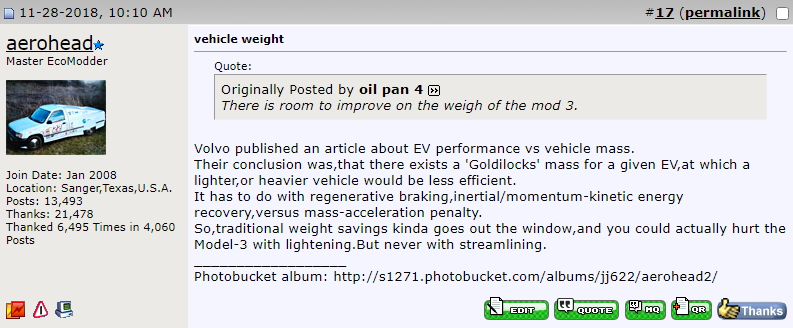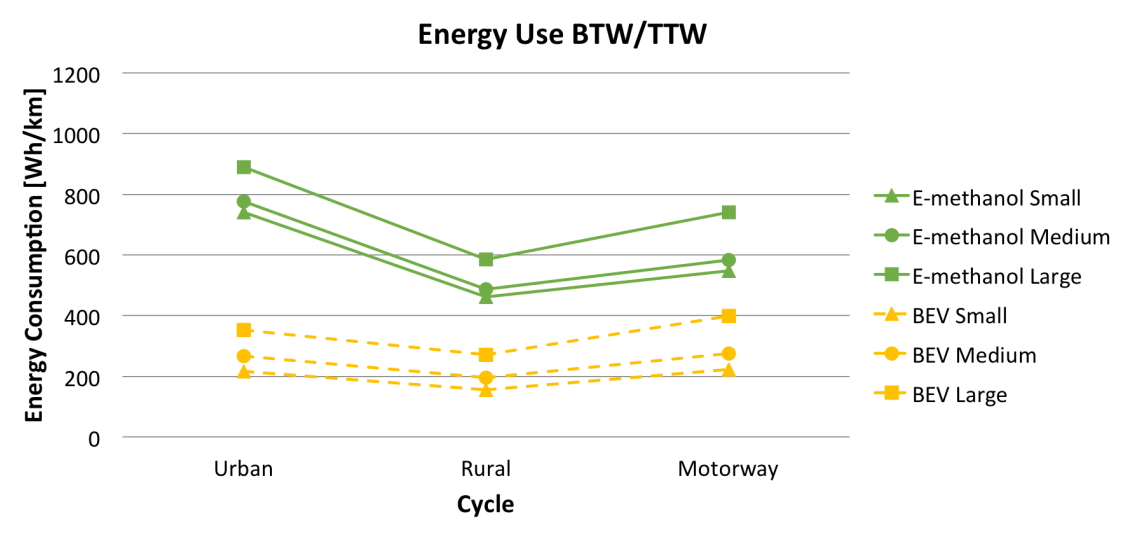 01-21-2022, 08:55 PM
01-21-2022, 08:55 PM
|
#21 (permalink)
|
|
High Altitude Hybrid
Join Date: Dec 2020
Location: Gunnison, CO
Posts: 2,127
Thanks: 1,165
Thanked 603 Times in 477 Posts
|
Quote:
Originally Posted by redpoint5

Still not getting it. It takes x amount of energy to accelerate y mass to z speed. Recovering that momentum is less than 100% efficient, meaning it would always be more efficient to reduce the amount of mass accelerated in the first place.
|
This is how I understand it too.
Plus more mass means more weight which means more rolling resistance.
Ideally all cars, with regen or not, would weigh as little as possible. A 1,000lb car will take about 1/6 the energy to accelerate to a particular speed than one that's 6,000lbs. If regen is 80% efficient on the 6,000lb car and the 1,000lb car has zero regen you'd still be using more net energy to accelerate and decelerate the heavier vehicle with regen than the lighter one with no regen.
__________________

|
|
|

|
|
The Following User Says Thank You to Isaac Zachary For This Useful Post:
|
|
 Today Today
|
|
|
|
 Other popular topics in this forum...
Other popular topics in this forum...
|
|
|
|
 01-21-2022, 11:59 PM
01-21-2022, 11:59 PM
|
#22 (permalink)
|
|
Master EcoModder
Join Date: Aug 2012
Location: northwest of normal
Posts: 29,311
Thanks: 8,336
Thanked 9,095 Times in 7,512 Posts
|
I re-read some of the thread.
Quote:
|
The takeaway for me was that, there is a 'sweet spot' for BEV inertia (vehicle mass ), at which an overall optimum efficiency is achieved, with respect to road load and the amount of energy that may be harvested by regeneration.
|
This is masterful trolling. Possibly catagorized as 'talking past the sale'. The optimum is a balance of a number of variables. I'm not sure of the equation, but the result would be expressed in Coulumbs.
Quote:
https://www.merriam-webster.com › dictionary › coulomb
coulomb: [noun] the practical meter-kilogram-second unit of electric charge equal to the quantity of electricity transferred by a current of one ampere in one second.
|
__________________
.
.Without freedom of speech we wouldn't know who all the idiots are. -- anonymous poster
___________________
.
.Impossible is just something we haven't done yet. -- Langley Outdoors Academy
|
|
|

|
 01-22-2022, 12:10 AM
01-22-2022, 12:10 AM
|
#23 (permalink)
|
|
Human Environmentalist
Join Date: Aug 2010
Location: Oregon
Posts: 13,012
Thanks: 4,374
Thanked 4,549 Times in 3,496 Posts
|
Quote:
Originally Posted by freebeard

I re-read some of the thread.
This is masterful trolling. Possibly catagorized as 'talking past the sale'. The optimum is a balance of a number of variables. I'm not sure of the equation, but the result would be expressed in Coulumbs.
|
Is that a real University? I finally clicked the stupid link, and the cover page for the "research" looks fake. I didn't go further if they aren't willing to put in enough effort to look legitimate from the get go. |
|
|

|
 01-22-2022, 10:22 AM
01-22-2022, 10:22 AM
|
#24 (permalink)
|
|
High Altitude Hybrid
Join Date: Dec 2020
Location: Gunnison, CO
Posts: 2,127
Thanks: 1,165
Thanked 603 Times in 477 Posts
|
And they don't have very good grammar. Plus I find it hard to believe that carbon-capture fuels would be cheaper than electricity.
Quote:
Electrofuels outperforms BEVís when it comes to range and even though much
more energy inefficient, e-methanol can be a more cost-efficient option in all
investigated driving cycles.
|
__________________

|
|
|

|
 01-22-2022, 11:27 AM
01-22-2022, 11:27 AM
|
#25 (permalink)
|
|
Moderator
Join Date: Feb 2012
Location: Urbana, IL
Posts: 1,939
Thanks: 199
Thanked 1,807 Times in 943 Posts
|
Quote:
Originally Posted by redpoint5

Is that a real University?
|
Yes, Chalmers is a real (and well-known) university in Goteborg, Sweden. I've been there; my master's advisor was director of the GOArt organ building research department at Chalmers.
The paper argues that their models predict close to the same efficiency (as a % of total energy put in) for large vs medium vs small BEV (*on the urban cycle only*) but increased total energy consumption for heavier BEV, as one would expect. The claim that "BEV and ICE diverge" is quite correct according to this modeling, but not because BEV are more efficient as they get heavier but less, while ICE are more efficient with increased weight because the engines work at higher load and better BSFC:

And the authors note that, for the ICE model,
Quote:
|
even though a higher efficiency is achieved with increased weight, a heavier car still consumes more energy, as earlier explained.
|
That is very different than claiming there is a "sweet spot at which overall optimum efficiency is achieved," as aerohead has used that to argue that increased weight of BEV isn't a detriment and may be a good thing. This paper doesn't show that. That's his own idea which he is attributing to another source to give it credibility.
|
|
|

|
|
The Following 3 Users Say Thank You to Vman455 For This Useful Post:
|
|
 01-22-2022, 09:58 PM
01-22-2022, 09:58 PM
|
#26 (permalink)
|
|
High Altitude Hybrid
Join Date: Dec 2020
Location: Gunnison, CO
Posts: 2,127
Thanks: 1,165
Thanked 603 Times in 477 Posts
|
I suppose there could be a "sweet spot" as far as how much cargo to carry if we were talking about something like semi trucks in which you could vary the load without worrying about extra load being just worthless dead weight.
__________________

|
|
|

|
 01-24-2022, 12:04 PM
01-24-2022, 12:04 PM
|
#27 (permalink)
|
|
Master EcoModder
Join Date: Jan 2008
Location: Sanger,Texas,U.S.A.
Posts: 16,483
Thanks: 24,508
Thanked 7,436 Times in 4,817 Posts
|
means
Quote:
Originally Posted by Isaac Zachary

This is how I understand it too.
Plus more mass means more weight which means more rolling resistance.
Ideally all cars, with regen or not, would weigh as little as possible. A 1,000lb car will take about 1/6 the energy to accelerate to a particular speed than one that's 6,000lbs. If regen is 80% efficient on the 6,000lb car and the 1,000lb car has zero regen you'd still be using more net energy to accelerate and decelerate the heavier vehicle with regen than the lighter one with no regen.
|
When every conceivable engineering consideration is investigated, an optimum mass is found. Everything you can think of, and everything you'd never think of, has already been investigated. It's that simple.
__________________
Photobucket album: http://s1271.photobucket.com/albums/jj622/aerohead2/
|
|
|

|
 01-24-2022, 12:43 PM
01-24-2022, 12:43 PM
|
#28 (permalink)
|
|
Master EcoModder
Join Date: Jan 2008
Location: Sanger,Texas,U.S.A.
Posts: 16,483
Thanks: 24,508
Thanked 7,436 Times in 4,817 Posts
|
'sweet-spot'
Page 26
4. Results
' The small BEV's efficiency is noticeably lower in the city cycle than the medium sized but responds predictably in the other the other two cycles in line with the larger cars. This rather strange behavior is connected to the regenerative braking which is dependent on available wheel power and mass.'
--------------------------------------------------------------------------------------
1) @ low velocity ( low aerodynamic drag ) , in an urban driving environment ( stop and go ) the 'medium' BEV has a 'regenerative' energy harvesting efficiency advantage over the less-massive 'small' BEV.
2) I'm not recommending the larger weight class vehicle, I'm simply pointing out the 'inertial' advantage of the 'medium' sized BEV.
3) I'm talking about the dynamics of a specific vehicle.
4) The 'small' BEV's efficiency ( its overall efficiency, including all other dynamic considerations ) benefits from a greater mass, and the context has to do with regeneration
5) That's all I ever said or implied.
6) All of your apologies are accepted.
__________________
Photobucket album: http://s1271.photobucket.com/albums/jj622/aerohead2/
|
|
|

|
 01-24-2022, 02:09 PM
01-24-2022, 02:09 PM
|
#29 (permalink)
|
|
Master EcoModder
Join Date: Aug 2012
Location: northwest of normal
Posts: 29,311
Thanks: 8,336
Thanked 9,095 Times in 7,512 Posts
|
Quote:
|
The takeaway for me was that, there is a 'sweet spot' for BEV inertia (vehicle mass ), at which an overall optimum efficiency is achieved, with respect to road load and the amount of energy that may be harvested by regeneration.
|
vs
Quote:
2) I'm not recommending the larger weight class vehicle, I'm simply pointing out the 'inertial' advantage of the 'medium' sized BEV.
3) I'm talking about the dynamics of a specific vehicle.
|
Moving the goal posts closer together?
I'll apologize for #22 just to be gracious, but not #17 nor #19. </sarcasm>
__________________
.
.Without freedom of speech we wouldn't know who all the idiots are. -- anonymous poster
___________________
.
.Impossible is just something we haven't done yet. -- Langley Outdoors Academy
|
|
|

|
|
The Following User Says Thank You to freebeard For This Useful Post:
|
|
 01-24-2022, 02:29 PM
01-24-2022, 02:29 PM
|
#30 (permalink)
|
|
Moderator
Join Date: Feb 2012
Location: Urbana, IL
Posts: 1,939
Thanks: 199
Thanked 1,807 Times in 943 Posts
|
Quote:
Originally Posted by aerohead

Page 26
4. Results
' The small BEV's efficiency is noticeably lower in the city cycle than the medium sized but responds predictably in the other the other two cycles in line with the larger cars. This rather strange behavior is connected to the regenerative braking which is dependent on available wheel power and mass.'
--------------------------------------------------------------------------------------
1) @ low velocity ( low aerodynamic drag ) , in an urban driving environment ( stop and go ) the 'medium' BEV has a 'regenerative' energy harvesting efficiency advantage over the less-massive 'small' BEV.
2) I'm not recommending the larger weight class vehicle, I'm simply pointing out the 'inertial' advantage of the 'medium' sized BEV.
3) I'm talking about the dynamics of a specific vehicle.
4) The 'small' BEV's efficiency ( its overall efficiency, including all other dynamic considerations ) benefits from a greater mass, and the context has to do with regeneration
5) That's all I ever said or implied.
6) All of your apologies are accepted.
|
You have argued in the past:

You contradicted oilpan4's (correct) assertion that a lighter Model 3 would be more efficient. This paper does not support that contradiction. It clearly shows that the heavier the car is, the more energy it uses per mile regardless of the effects of regenerative braking:

You seem to be confusing efficiency of the movement of energy from battery to wheels with efficiency of energy per distance traveled. They are two different things.
|
|
|

|
|